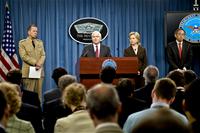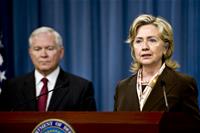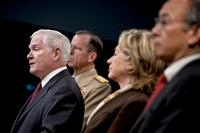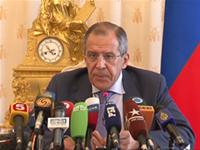Obama reSTARTs nuclear disarmament
Ralitsa Kovacheva, April 11, 2010
 How to reduce our nuclear arsenal while keeping our capability to maintain effective deterrence: thus the Defense Secretary Robert Gates explained the point of the new American Nuclear Posture Review (NPR). Such a review is being done by every American leader since 1991 - the last one was in 2001, the beginning of George Bush's first term.
How to reduce our nuclear arsenal while keeping our capability to maintain effective deterrence: thus the Defense Secretary Robert Gates explained the point of the new American Nuclear Posture Review (NPR). Such a review is being done by every American leader since 1991 - the last one was in 2001, the beginning of George Bush's first term.
This year's NPR though, marks an historic change in the US nuclear behavior, all parties involved in its creation noted. The NPR significantly narrows the possibility the United States to use or threaten to use nuclear weapons. As Secretary Gates said, “New declaratory policies remove some of the calculated ambiguity in previous U.S. declaratory policy.”:
“If a non-nuclear-weapon state is in compliance with the nonproliferation treaty and its obligations, the U.S. pledges not to use or threaten to use nuclear weapons against it. If any state eligible for this assurance were to use chemical or biological weapons against the United States or its allies or partners, it would face the prospect of a devastating conventional military response.”
“This enables us to sustain our nuclear deterrent for the narrower range of contingencies in which these weapons may still play a role, while providing an additional incentive for nations to meet their NPT obligations”, President Barack Obama pointed out in his special statement. Still, “Those nations that fail to meet their obligations will therefore find themselves more isolated, and will recognize that the pursuit of nuclear weapons will not make them more secure.”
Asked by a journalist, Defense Secretary Gates said, that “if there is a message for Iran and North Korea here, it is that if you're going to play by the rules, if you're going to join the international community, then we will undertake certain obligations to you, and that's covered in the NPR. But if you're not going to play by the rules, if you're going to be a proliferator, then all options are on the table in terms of how we deal with you.”
According to the State Secretary Hillary Clinton, “it is the first unclassified NPR  in its totality.”
in its totality.”
With the document the United States commits to apply several key principles:
First, the United States will not conduct nuclear testing and will seek ratification and entry into force of the Comprehensive Nuclear Test Ban Treaty.
Second, not to develop any new nuclear weapons.
Finally, in any decision to proceed with engineering development of warhead life-extension programmes, the United States will give strong preference to the options of refurbishment or reuse.
According to President Obama, The Nuclear Posture Review recognizes that “the greatest threat to U.S. and global security is no longer a nuclear exchange between nations, but nuclear terrorism by violent extremists and nuclear proliferation to an increasing number of states. Moreover, it recognizes that our national security and that of our allies and partners can be increasingly defended by America’s unsurpassed conventional military capabilities and strong missile defenses.”
 The defense Secretary Robert Gates noted that “the NPR concluded that stable deterrence can be maintained while reducing U.S. strategic nuclear vehicles by approximately 50 percent from START I levels” and “the United States will pursue high-level bilateral dialogues on strategic stability with both Russia and China”.
The defense Secretary Robert Gates noted that “the NPR concluded that stable deterrence can be maintained while reducing U.S. strategic nuclear vehicles by approximately 50 percent from START I levels” and “the United States will pursue high-level bilateral dialogues on strategic stability with both Russia and China”.
On April 8th President Barack Obama signed in Prague the new START Treaty with his Russian counterpart Dmitry Medvedev. The Treaty provides that seven years from the date it enters into force, the total amount of weapons each side has must not exceed 700 ballistic missiles, 1,550 warheads attributed to them and 800 launchers. “Under the new Treaty the total number of warheads will be reduced by a third and the threshold level for strategic delivery systems will be lowered by more than two times”, the Russian foreign minister Sergey Lavrov announced two days before the signing ceremony. He also explained that these numbers include the nuclear as well as conventional warheads and the carriers for them.
The Treaty makes a direct link between Russia's participation in it and the development of the American missile defense:
„The Russian Federation, in particular, will be entitled to withdraw from the Treaty if the quantitative and qualitative capacity building for US strategic missile defense begins to have a significant impact on the effectiveness of the Russian strategic nuclear forces. Of course, we ourselves will determine the extent of such influence. This will be especially specified in the statement of the Russian Federation, which will be part of the package to the Treaty, and in the response statement of the United States.”
We are closely watching the development of the plans for a missile defense system of  the United States, Lavrov said. He explained that currently the plans were on a stage ”regional systems, systems that do not prejudice strategic stability, and do not create risks for the Russian strategic nuclear forces.” Asked if Russia would withdraw from the Treaty in case of deployment of some elements of the American missile defense in Bulgaria and Romania, Lavrov denied to speculate about it.
the United States, Lavrov said. He explained that currently the plans were on a stage ”regional systems, systems that do not prejudice strategic stability, and do not create risks for the Russian strategic nuclear forces.” Asked if Russia would withdraw from the Treaty in case of deployment of some elements of the American missile defense in Bulgaria and Romania, Lavrov denied to speculate about it.
“With regard to Bulgaria and Romania, we have already voiced our comments. We believe that in a situation where on the instructions of the Presidents of Russia and the US direct consultations are being conducted, a direct dialogue is being conducted between our and American experts on missile defense issues, it would be better to avoid such surprises.”
According to the Russian Foreign Minister, the threats should be analyzed jointly and common decisions should be taken, not only between the United States and Russia but also with the European countries.
This Russian position corresponds to the intentions of the US and Europe to include Russia in the discussions on a future common missile defense system. “We invite Russia to join NATO in developing a missile defense system that can protect all citizens of Europe and of Russia as well”, the Secretary of State Hillary Clinton announced in February. So far Moscow has not commented on such a possibility.
Asked if she could imagine a time in the future when Russia could be a member of NATO, secretary Clinton joked: “Well, I can imagine it. I’m not sure the Russians can imagine it".